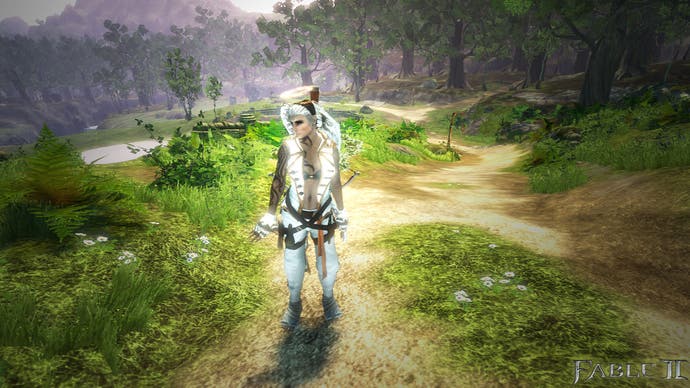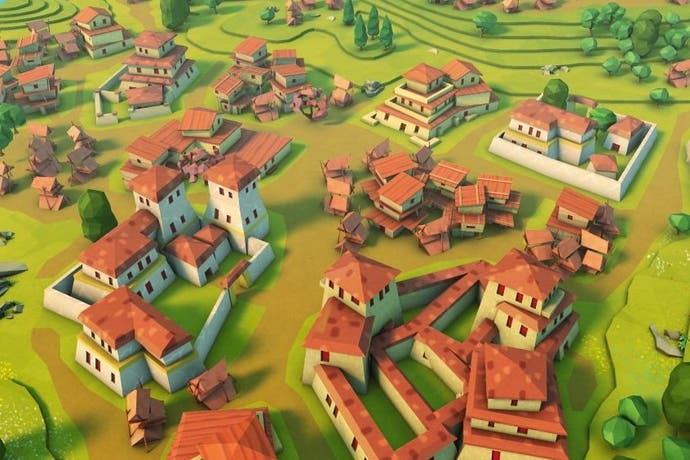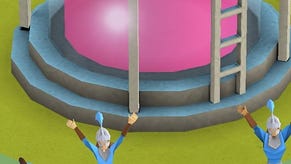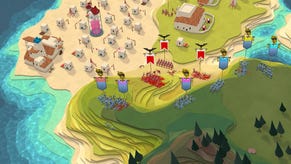Rich Stanton on: Requiem for a dreamer
The god-damned tragedy of Peter Molyneux.
The story of how Peter Molyneux got his big break in the games industry is revealing. After his first game The Entrepreneur failed to sell, Molyneux gave up on games and started exporting baked beans to the Middle East. Soon afterwards Commodore, confusing Molyneux's company Taurus with a networking company called Torus, flew him to the States and mistakenly offered him ten brand-new Amigas.
"I remember it vividly going through my head," says Molyneux . "There was like an angel and a devil on my shoulder. One saying 'Go on you've got to tell the truth, you can't lie like this.' Then this other voice saying 'Just lie. Just lie, get the machines, and sort it out afterwards.' Of course, I ended up lying."
What would you have done? I like to think I'd have been a big enough man to come clean, but without being in that situation it's impossible to say.
But we know what Molyneux did. Thus was his career founded on a deception and, for decades since, his games have been synonymous with ambition, exaggeration, and under-delivery. It is only comparatively recently that things have come full circle, and into the widespread perception that Peter Molyneux is a liar.
For a designer obsessed with making games about morality, it's one hell of a place to end up.
I've met Peter Molyneux once, and he absolutely enraptured me. It was a few months before the release of Fable 2 and I visited Lionhead. He was incredibly charming and hospitable, but much more than that he was exciting to be with. Even as Molyneux demoed Fable 2 and exclaimed that he'd never seen an obviously-placed treasure chest before, I was swept along by his palpable enthusiasm for the game.
I remember with absolute clarity when the scales fell from my eyes. I wrote an article that puffed Fable 2 to the heavens, and shortly afterwards ended up reviewing the game. I noticed to my consternation that a minor aspect of the game he'd discussed, and I'd written about, wasn't there. Fable 2 was still great but I felt awful, like I'd deceived my readers and somehow betrayed their trust. While having some beers with colleagues I moped about it a bit.
One turned my way and shot back: "Well, Molyneux doesn't care does he?"
To my naïve brain, that was a lightning bolt. And here's why it matters. Defenders of Molyneux often characterise his exaggerations as a kind of motivating tactic: a feature may not be in the game, goes this logic, but by talking about it Molyneux is trying to gee-up his team to work towards it. He is trying to get people to shoot for the moon.

In this case I'd spoken to him roughly two months before the game launched. No features are added to AAA games in the last two months of work - the team is rushing to the finishing line and ironing out bugs. In this case it would have been strange if Molyneux's intention was to motivate his team. It felt more like he'd tried to get me more hyped about Fable 2 by exaggerating an aspect I was clearly interested in, with the certain knowledge that what he was talking about was not in the final game.
I could go through a list of things Molyneux has said about his games, and then show how the games failed to deliver. I could compare Godus to the original Kickstarter pitch. Or write about the frankly incredible YouTube video 22Cans posted earlier this week, where even his own employees don't seem to believe the man anymore. But what's the point? We all know the contours.
The first thing to acknowledge is that Molyneux is who he is because of the accumulation, over years and years, of indulgence from the gaming audience and media. Why? Let's be honest: 99 percent of 'big' developers give interviews that are dull as ditch-water. It's not so much that they're personality-free zones, but more the media training out the wazoo.
Molyneux, by contrast, is a journalist's wet dream. Every single outlet is complicit in his status. On the phone he's funny, strikingly honest on certain topics, and always has something controversial that makes a good headline. In person he's even better, mesmerising in full flow and with bright green eyes that make it seem all the lights in the universe are trained on you. This doesn't excuse anything, but it's fundamental context to his public image.
This is why, when considering the people who trusted Molyneux enough to invest in Godus, the games media has to shoulder some blame. There was little scrutiny of his promises - there never is until after the event. At which point Molyneux tries to neuter criticism, and dodge the difficult questions, by donning his hairshirt.

Media manipulation is one thing, and I would never criticise a developer for 'playing' journalists. It's their job. But with Godus Molyneux stepped into a new arena, one where the money was coming directly from punters rather than publishers. And manipulating paying customers is another matter entirely - especially when the game crosses a line, as it has with certain promises and rewards, into failing to deliver.
Consider Bryan Henderson, the winner of Curiosity and thus 'God of Gods,' whose prize turned out to be that he was a useful prop cast aside once the moment passed. Wesley Yin-Poole's outstanding piece on Henderson earlier this week contained one revelation that floored me: the fact 22Cans ignored this young man for just under a year as he politely enquired about when his prize might arrive. They just outright ignored him. Then when the press got involved, all of a sudden Molyneux's apologising.
It's a familiar cycle. Screw up and apologise, rinse and repeat. The apologies are always full of caveats. The problem with Godus, according to Molyneux, is not that he's a terrible project manager who promised stuff he had no idea how to deliver. The problem is that it's the first game he did on Kickstarter. And it's the first one he did on Early Access. Or the publisher did something. There's always a caveat, always a distraction, always a deflection in the same breath as the heart is bared.
This is the nasty undercurrent to the excuses. Molyneux puts up his hands and undergoes the ritual humiliation with an earnestness that borders on relish. The thing that is impossible to put a finger on is where the calculation begins and ends. Molyneux has cried in front of so many journalists it's hard not to be suspicious, and some of his statements are astonishing.
Most nauseatingly, to my taste at least, Molyneux compared negative reactions to Godus to being bullied at school. "I feel now I am universally hated by the gaming people. I was bullied at school. Badly bullied at school. And I feel some of that emotion bubbling up again inside me now." Bullying is a horrible thing for anyone to go through, and I would never deny that such an experience can ripple through an adult life. That said, Godus is a multi-million pound project that Molyneux directed and managed in his mid-50s. Casting himself as the victim in this situation shows either a lack of self-awareness and proportionality, or an acute sense that it's the kind of subject his critics will be too sensitive to question. Maybe both.
Despite all of this, a tiny part of my brain still believes in Molyneux. And this is the whole point: were Molyneux a total fraud, no-one would be interested. He'd be a minor annoyance. But because of Bullfrog and Lionhead, and not forgetting the hard work and talents of many others, he has a record that includes several truly special games.

This is why when I see people calling Molyneux a fraud or a thief I can't agree. It used to be because I wanted to believe he'd produce another great game. Perhaps now it's that the truth is so messy it's simply easier to throw around these hurtful words than engage with it: perhaps Molyneux is trapped and scared and has lost control of the situation. Perhaps the truth is that without a large and talented team to bail him out, like the old days, he has created a mess where mea culpas make it worse rather than better.
And when faced with the catalogue of disastrous behaviour and project management that is 22Cans, all Molyneux has are those mea culpas. The way he puts a loudspeaker to his errors is not repentance - not now, not after we've seen it a thousand times. The only consistent element of Molyneux's apologies is their regularity, and this very repetition is an hypocrisy. It's a simulation of shame.
Molyneux's reputation has been on shaky ground for a long time, but this week marked a nosedive. He's currently giving a round of interviews claiming he'll no longer speak to the press - which the uncharitable might take as another deflection. Only a fool would deny the press bear some responsibility for his current situation; but it would take an even bigger fool to continue to regard Molyneux as an innocent abroad, the victim in all of this.
So where to? The writer and radio host Garrison Keillor once said something which fits. "The reason to retire is to try to avoid embarrassment; you ought to do it before people are dropping big hints. You want to be the first to come up with the idea. You don't want to wait until you trip and fall off the stage."
What is currently happening to Molyneux's reputation is a feeding frenzy; parts of it may be deserved, but the whole is no less tragic. There is yet the time for a somewhat dignified exit, but that will never happen. Of course he will speak to the press again and, spread-eagled in the stalls, plead for another chance. The next time, he says with tears in his eyes, will be different.
It is hard to look coldly at Molyneux, to completely hive-off all the joy I've had from games he's been involved with and forget that part of me that wants to believe. Hard but not impossible. What I've seen in the course of this week is an old emperor, naked and exposed, cringing as his former subjects jeer and laugh. I could never join in. But I can't quite bring myself to weep, either.










